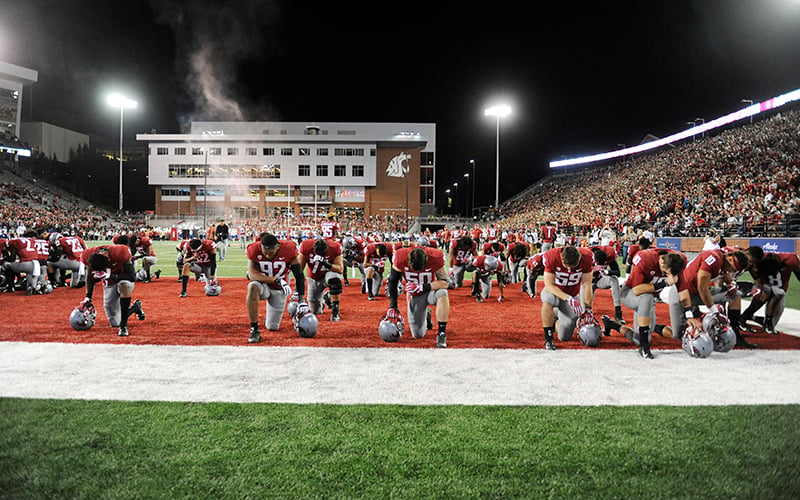PHOENIX – If your ankle is hurting, you say something. If you have a headache, you express the pain you’re feeling. When it comes to mental health, communication is not always clear cut. Hilinski’s Hope is working to end that stigma.
Colleges and universities across the country, including the University of Arizona, Arizona State and Northern Arizona, last Saturday kicked off College Football Mental Health Week, an initiative sponsored by Hilinski’s Hope. The non-profit organization was founded in 2018 following former Washington State quarterback Tyler Hilinski’s suicide.
It’s why ASU players will be wearing lime green ribbon helmet stickers with the number “3” in the middle honoring Hilinski, when the Sun Devils play Stanford Friday.
The second annual College Football Mental Health Week, which runs through Saturday, hopes to increase awareness of mental health issues on college campuses and provide resources for athletes and coaches. This coincides with Mental Illness Awareness Week, culminating with World Mental Health Day Oct. 10.
“It’s just something to display our commitment to mental health, for not just student athletes, but all students,” said Christine Lombardi, Hilinski’s Hope operations director.
More than 70 schools have committed to participating in the week-long festivities, up from 20 schools that participated last year. Activities involve athletes, coaches and staff speaking with one another about personal experiences and how to help their peers when they sense someone could be in distress.
“We want to normalize the conversation around mental health, just like we do about physical health,” Lombardi said. “The goal for mental health is that not only do you ask for help when you need it, but you actively participate in your own mental wellness.”
There were nearly 140 million media impressions from the event last year. Hilinski’s Hope is aiming for 200 million media impressions this time to make an even stronger impact.
“We’re not alone, but there are so many agencies or foundations out there that are really championing this cause and individuals that are championing this cause in their own ways,” Lombardi said. “We’re all working together and it’s kind of a phenomenon in the world today, and it gives hope for many things in the way we can work together.”
The statistics are staggering. Suicide represented just over 7% of the 447 deaths among NCAA athletes over a nine-year period, according to a 2015 NCAA analysis. The rate of suicide among male athletes is a full point higher than female athletes. More than 37% of college athletes who die by suicide are football players, the highest rate among NCAA athletes.
Suicide is the 10th leading cause of death in the U.S, according to the National Alliance on Mental Illness, with more than three quarters of them being male. One-third of college students suffer from mental health issues at some point during their time as a student, according to Athletes for Hope. Among college athletes, only 10% seek help.
“Emotions and thoughts and feelings are applicable to everybody, I think that’s really the corner that we’ve turned on as a general society,” said Dr Rachel Webb, University of Arizona Assistant Athletic Director, Sport Psychology and Wellness. “When we can use weeks and platforms like this one to educate and have a better understanding of what mental health is and how to take care of ourselves, people are more and more willing to walk down that path and get the help that they need.”
The conversation around mental health took off this summer following revelations by U.S. Olympic gymnast Simone Biles, who publicly shared her mental health struggles and the toll it took on the pressure to perform. Being physically ready and mentally ready were two different things. Biles, along with professional tennis player Naomi Osaka, have put the topic of mental health on a global stage.
“This year, more than ever, student-athlete mental health has been in the spotlight and while conversation around mental illness can be tough and even at times uncomfortable, it is absolutely critical for the overall health and well-being of our student-athletes,” Hilinski’s Hope co-founder Mark Hilinski said in a press release last week. “Throughout the last year, we’ve continued to see support from schools, fans, students and parents as they join us in the fight against mental illness and that is a major piece of the puzzle that will help destigmatize mental illness and increase mental health resources.
In Tucson, the University of Arizona is holding a variety of events throughout the week to commemorate the event. Among the activities were yoga sessions, smoothie and T-shirt giveaways and guest speaker appearances.
“We try to engage just from a conversation standpoint, we want these initiatives to spark conversations on mental health and how we’re taking care of ourselves,” Webb said. “We also use the week to demonstrate different ways to take care of ourselves so it’s not just destigmatizing and feeling more comfortable to talk about mental health and well-being.”
Participating schools will act in different ways throughout the week. Most schools will be wearing the helmet stickers. Additionally, players, coaches and fans will also hold three fingers to the sky during the first play of the third quarter of their respective football games.
While people have been more open about sharing their stories surrounding mental health struggles, and plenty of inroads have been made, there is still plenty of work to be done.
“I think there still needs to be a lot of education and understanding of how all aspects of somebody’s life, the way we think with the way we feel, the way we respond to situations and just what we’re going through has a direct influence and impact on our mental well being overall,” Webb said.
A simple conversation with a friend or sibling can be beneficial and can potentially save a life.
“Be a part of the noise that’s being created for normalizing mental health and also speak up and say when you need help or have a conversation,” Lombardi said. “The thunderous cloud of sound or noise can start with one person.”
No. 22 Arizona State hosts Stanford Friday night in a prime-time showdown to open the Copper State’s College Football Mental Health Week contests. Arizona hosts UCLA and Northern Arizona hosts Southern Utah, both on Saturday.



